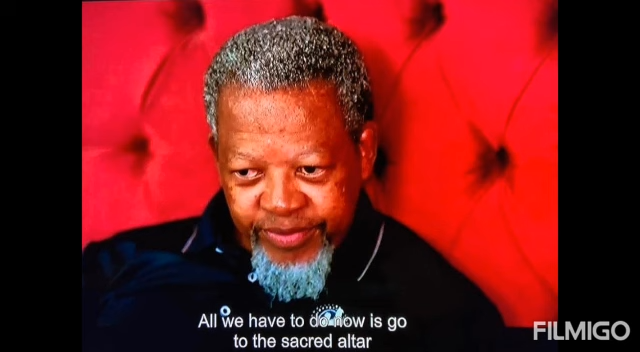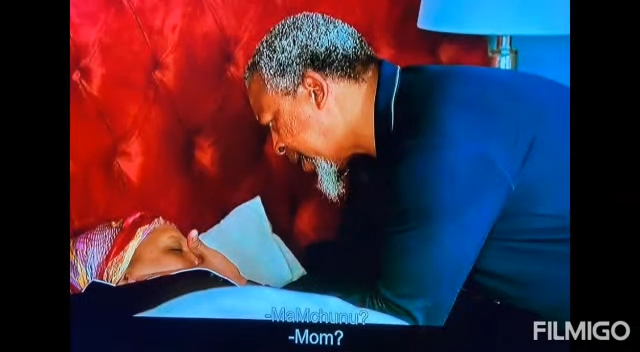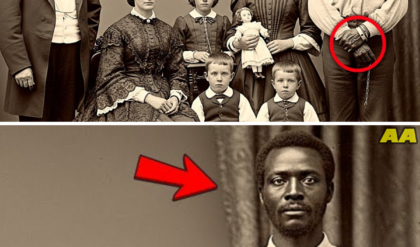The Fall of a Giant: The Legacy of Mamchunu

In a small village nestled between rolling hills, the air was thick with sorrow.
The news had spread like wildfire: Mamchunu, the beloved matriarch of the Shabalala family, had passed away.
She was not just a character in the village; she was a legend, a beacon of hope and love for many.
Her presence was as comforting as the shade of the great tree that stood in the village square, where countless memories were made.
Mamchunu was known for her wisdom and kindness.
Everyone turned to her for advice, from young couples seeking guidance in their relationships to elders reminiscing about the past.
Her laughter could brighten the darkest days, and her hugs felt like home.
But now, the village felt empty without her vibrant spirit.
As the sun set on the day of her passing, villagers gathered under the great tree to pay their respects.
The atmosphere was heavy with grief, and stories of Mamchunu filled the air.
“Do you remember when she helped us through the drought?” one villager recalled, wiping away tears.
“She organized a community feast to lift our spirits,” another added, a faint smile breaking through the sadness.
Mamchunu had a unique ability to bring people together.
Her home was always open, filled with laughter, food, and love.
She often said, “A family is not just about blood; it’s about the bonds we create.

This philosophy resonated with many, and her home became a sanctuary for those in need.
But as the villagers reminisced, a darker cloud loomed over the gathering.
Whispers began to circulate about the circumstances of Mamchunu’s death.
Some believed it was due to old age, while others speculated about the stress from family disputes.
“Who is to blame for her passing?” one voice questioned, igniting a heated discussion among the villagers.
Thulani, Mamchunu’s eldest son, stood up to address the crowd.
“Let’s not point fingers in our grief.
My mother always taught us to seek understanding, not blame,” he urged, his voice trembling with emotion.
He felt the weight of the world on his shoulders, knowing that the family dynamics had become strained in recent years.
Mamchunu had been the glue holding the family together, and now that she was gone, the cracks began to show.
Zanele, Thulani’s younger sister, felt a surge of anger.
“She sacrificed so much for this family!
We can’t let her legacy be tarnished by our disputes,” she exclaimed, her voice rising above the murmurs.
The tension in the air was palpable as family members exchanged glances, each grappling with their own feelings of guilt and sorrow.

As the night wore on, stories continued to flow, but the conversation took a more somber turn.
“Remember the time she stood up to the village council?” one villager recalled.
Mamchunu had fought for fair treatment of all families, regardless of their wealth.
“She believed everyone deserved a voice,” another added, admiration shining in their eyes.
Her courage inspired many, and her legacy of fighting for justice would never be forgotten.
But with her passing, questions arose about who would continue her fight.
“Who will stand up for us now?” a voice echoed from the back of the crowd.
Thulani felt the weight of expectation as he looked around at the faces of his community.
He knew he had big shoes to fill, but he also felt the pressure of family dynamics weighing heavily on him.
In the days that followed, the village mourned.

Mamchunu’s funeral was a grand affair, with people from neighboring villages coming to pay their respects.
The great tree stood tall, a silent witness to the love and loss that enveloped the community.
As they buried her, villagers shared their fondest memories, promising to honor her legacy.
Yet, the tension within the family was palpable.
Zanele and Thulani found themselves at odds over how to manage their mother’s estate.
“I believe we should keep her home as a community center,” Zanele proposed, hoping to continue her mother’s legacy of unity.
But Thulani had different ideas, wanting to sell the property to settle debts.
“Mom would want us to be practical,” he argued, frustration creeping into his voice.
The siblings’ disagreements escalated, drawing in other family members.
“Why can’t we just honor her memory without fighting?” Thandi, their cousin, pleaded.
But emotions were raw, and grief often manifested as anger.
The family found themselves divided, echoing the very disputes Mamchunu had worked so hard to mend.
As weeks turned into months, the village slowly began to heal.
Yet, the absence of Mamchunu left a void that could not be filled.
People began to notice the changes in their community.
The great tree, once a symbol of unity, became a reminder of the loss they all felt.
One evening, as the sun dipped below the horizon, Thulani sat beneath the tree, reflecting on his mother’s teachings.

He remembered her words: “Forgiveness is the key to healing.
”
With a heavy heart, he realized that holding onto anger would only perpetuate the cycle of grief.
He decided it was time to reach out to Zanele and mend their relationship.
“Zanele,” he called out, spotting her nearby.
“I think we need to talk.
”
She looked hesitant but nodded, sensing the sincerity in his voice.
As they sat together under the great tree, they shared their feelings, fears, and regrets.
“I miss her so much,” Zanele admitted, tears streaming down her face.
“I don’t want to fight anymore.
”
Thulani reached out, taking her hand.
“Neither do I.
Let’s honor her by coming together, just like she would have wanted.
”
In that moment, they both understood that Mamchunu’s legacy was not just about her teachings but also about the love that bound them as a family.
As the seasons changed, the village began to heal.
The great tree stood tall, a testament to resilience and unity.
Thulani and Zanele worked together to transform their mother’s home into a community center, just as she had envisioned.
They invited villagers to share their stories, creating a space for connection and healing.
Through this process, they found solace in each other and the community.
Mamchunu’s spirit lived on in the laughter and joy that filled the center.
The siblings learned to appreciate their differences and grow closer, honoring their mother’s legacy in their own unique ways.
In time, the village transformed their grief into a celebration of Mamchunu’s life.

They held annual gatherings under the great tree, sharing stories, laughter, and love.
Mamchunu had taught them that family is not just about blood; it’s about the bonds we create and the love we share.
As the years passed, the memory of Mamchunu remained alive in the hearts of the villagers.
Her teachings continued to guide them, reminding them of the importance of unity, forgiveness, and love.
The great tree, once a symbol of loss, became a beacon of hope and resilience.
Thulani and Zanele often found themselves sitting beneath its branches, reminiscing about their mother.
“We did it, Zanele,” Thulani would say, a smile spreading across his face.
“Together, we honored her legacy.
”
And in that moment, they both knew that Mamchunu would be proud.
The village thrived, united by the love and lessons of Mamchunu.
Her legacy lived on, reminding everyone that even in the face of loss, love can conquer all.
As they gathered each year under the great tree, they celebrated not just Mamchunu’s life but the enduring bonds of family and community that she had nurtured.
And so, the story of Mamchunu and her family continues, a testament to the power of love, resilience, and the unbreakable ties that bind us all.
.
.
.
.
.
.
.
.
.
.
.
.
.
.
.
.
.
.
.
.
.
.
.
.
.
.
.
.
.
.
.
.





